“Magic and technology are completely entangled — technology dreams of being magical”, Joey Holder writes in response to a question about the long-standing relationship between technological innovation and esoteric practices. The artist is one of a group of people behind Nottingham’s newest project space, Chaos Magic, currently presenting the Queer Spirits events series through the month of February. It will culminate with an exhibition by Richard John Jones and Sebastian Sochan, Fittings, which opens on February 21, 2019.
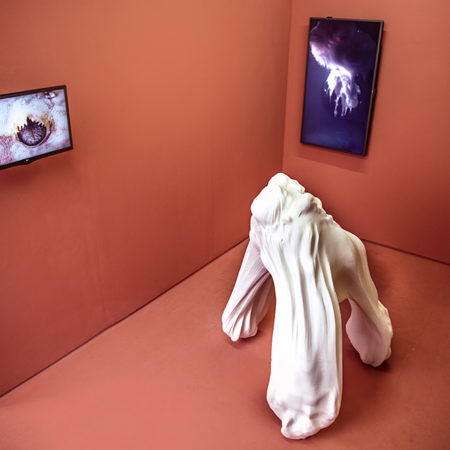
Laila Blebleble and Solveig Settemsdal, THEN OUTSIDE FROM NOW INSIDE (2018). Exhibition view. Photo by Julian Zizko. Courtesy the artists + Chaos Magic, Nottingham.
The programme explores the occult and its relevance to contemporary art, where Chaos Magic hosts exhibitions, holds a library of reading materials and puts on performance events, as well as regular tarot readings. Taking its name from an esoteric practice that interrogates the power of belief systems to skew how we perceive reality, the collective is a timely project for our uncertain ‘post-truth’ political present. In a social climate that is at once hyper-technological, abounding with culture wars, and in enjoying a resurgence of interest in mysticism, Chaos Magic is well placed to examine our current moment through a multidisciplinary arts practice.
We spoke via email with the six members of Chaos Magic — five recent graduates from Nottingham Trent University: Christina Cushing, Theo Gilmour-Rees, Ryan Heath, Hannah Parikh, Joseph Winsborrow, along with the artist Holder acting as a mentor — to get a sense of the project’s context in contemporary Britain, as well as the continually brewing relationship between the arts and the occult.
**Can you tell us a bit about how you came together as a group, and what your intentions with the project were from the outset?
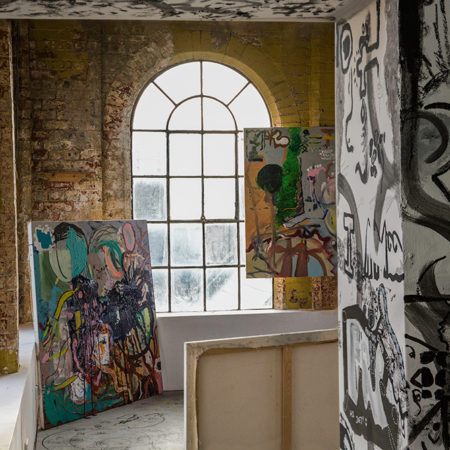
Joey Holder: At the time of thinking about running a project space I was researching [the esoteric practice of] chaos magic within my own artistic practice and the nature of belief. Chaos magic rejects the existence of absolute truth and instead proposes that reality can be changed, or perhaps created through strong belief. So in other words we could say that if we practice this craft, we are able to manipulate the world around us. I was interested in this idea and how it relates to art making and the potential of art to be a catalyst for change. And also art as magic itself. I wasn’t interested in just putting on exhibitions that showcased artists’ work and boosting their CVs; there needed to be a wider conversation between their work and the world.
Joseph Winsborrow: On hearing about what Joey wanted to do with Chaos Magic as a space, I was interested in the concept of rejecting truth. I felt that what had existed in Nottingham during my undergraduate [studies] was not a fit for me. I felt the need and desire for something more fluid and more adaptable. Plus having already been interested in the notions of mysticism, reality, and sex magick, I felt that Chaos Magic would allow me to expand on my own interests, while also providing an opportunity to put on the events I felt were missing in Nottingham.
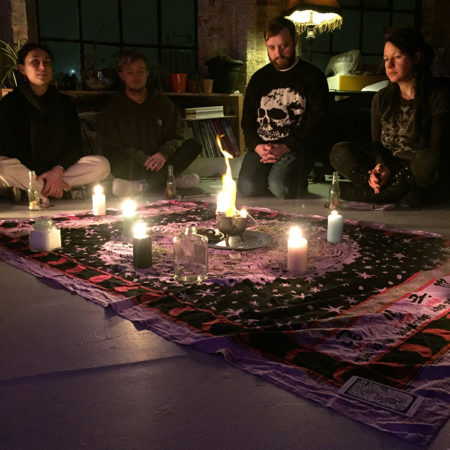
**So chaos magic as a practice is as much about magic as it is investigating belief systems and how we establish truths. What are your thoughts on this in relation to digital culture? For instance, one example is how algorithms affirm our beliefs and sense of the truth…
JH: I think magic is something which can’t be grasped or understood, something more powerful and complex than our own narrow viewpoint. There are so many things that are beyond the limitations of human knowledge and understanding, so we call them magical or supernatural. Computation appears to be like magic because it’s very difficult for us as individuals to understand its operations. Algorithmic processes are black boxes, hidden from everyday life, but which occur everywhere in the background.
JW: For me, the practice of chaos is about shaping your own reality. In some ways digital culture doesn’t allow for this, but if you know how to play the algorithm you can shape whatever fantasy you desire. Or, at the very least, shaping other people’s perceptions of your reality.
Ryan Heath: Exactly that! Chaos Magic promotes divination over dogma. It can act as an antidote to these determinate algorithms we’ve mentioned. The practice has deep skepticism of objective truths… which is way less fucking boring.
Theo Gilmour-Rees: I’m not sure I entirely understand the question. I prefer to think that the manipulation of digital algorithms only works by exploiting a human’s desire to reaffirm what one already believes. After watching Adam Curtis on [BBC] iPlayer it was ironic how many times I saw the term ‘echo chamber’ on my social media platform. I wouldn’t mind being able to run simulations of myself to see how many version it took before I became say a Christian, or whatever it is I’m trying to explain via this tangent. Maybe I’m just a narcissist.
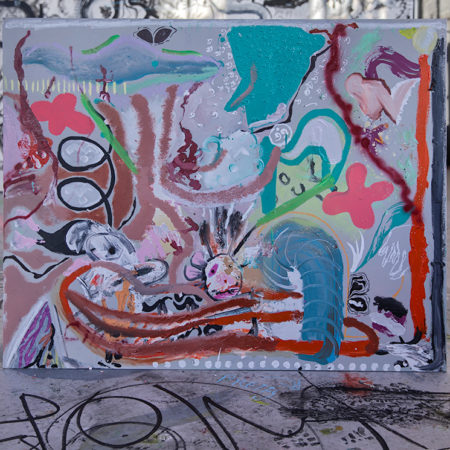
**England has a particular history with the occult. Is this something you’re unpacking with Chaos Magic?
JH: It’s funny at our first event OUROBOROS (a publishing fair) we had two local witches who came along and questioned me about my interest in ‘craft’, as in magical craft. I immediately felt like a fraud, and felt like I didn’t know enough about the subject to build a programme around it. Now I feel much more comfortable, safe in the knowledge that magic can be something very open and intuitive, and could be simply a daily personal ritual that you have.
TGR: I think this something we will have to unpack, at least attempt to. Perhaps just a few items out the bag, it would be rude not to. As Joey mentions above there is a feeling of fraudulence when a practicer and firm believer of witchcraft comes along. What I’m only just realising is there is an expansive tradition of occultishness in Britain that traces itself back to pre-Roman Britain, often taking place on the peripheries of our culture. I think it’s fascinating how several subcultures associate themselves with the history of the British Isles via occultish practices, i.e. festivals taking place at sacred or ancient sites.
**It seems to be an interesting moment for contemporary art in Nottingham. Where does Chaos Magic sit in relation to the wider contemporary art activities in Nottingham right now?
TGR: Massive, Big Tings, BIG TINGS. Best gallery in Sneinton, haha!
RH: You’re right, the city seems to be a fertile area for the arts at the mo’. We’ve got large [Arts Council England] National Portfolio organisations like Primary and Backlit alongside national institutions like Notts Contemporary. These are all amazing cultural centres, some who’ve transformed from artist-led into established centres — but that step-up does leave a void. I think as recent grads we wanted to continue being part of this ecosystem but felt there was a lack of knowledge in how to move on from being a student that wasn’t being addressed.
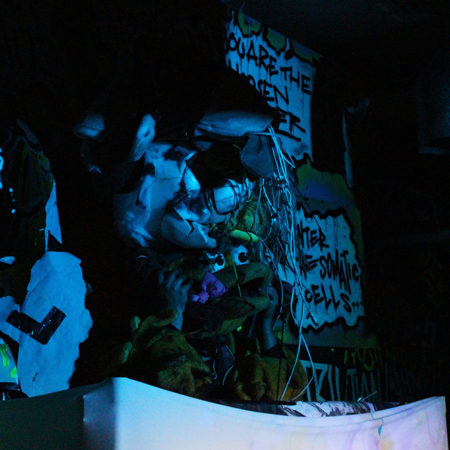
JH: Yes, following on from Ryan, while thinking about the set up of the space I wanted it to be centred around offering help to recent art graduates, which is something which seems to be lacking in most places, not just Nottingham. Sure, there are short term internships at some art organisations, but not long term, hands on experience. There’s also some great practitioners based in Nottingham: Reactor, Leon Sadler, Lisa Selby (Blue Bag Life), Matt Woodham to name but a few…
HP: Chaos Magic is unique in that it creates opportunities for graduates straight out of art school. I think you build a lot of energy that peaks at the end of your degree. Being able to transfer that into running a space and creating something together has been so refreshing! Like Joey said, the “hands on” nature of running Chaos Magic is really important. I think it allows the space to continually be a place of learning for all involved.
**I’m interested in the upcoming project Queer Spirits. Can you tell us a bit about queer magic practices?
JW: Queer Spirits began with talking to a practising Radical Faerie on Grindr. What attracted my interest was the mention of ‘Sex Magick’, and I knew that I had to find out more. Through conversation, I learnt more about the context of Radical Faeries and what they practice. A lot of Faerie practice is focused on community, connectivity, and spiritual love. Through meditation and sex magic, I came to understand more about my own queer spirituality, which eventually led me to become a practising witch. Going through this journey, I began to realise that there are so many forms and paths that any queer individual can take; from creating your own identity as a spell caster, to a practicing Zen Buddhist navigating their own gay sexuality. With Queer Spirits I hope to begin to unpack some of these experiences and personal histories so that people can learn together what queer spirituality and magic can be.
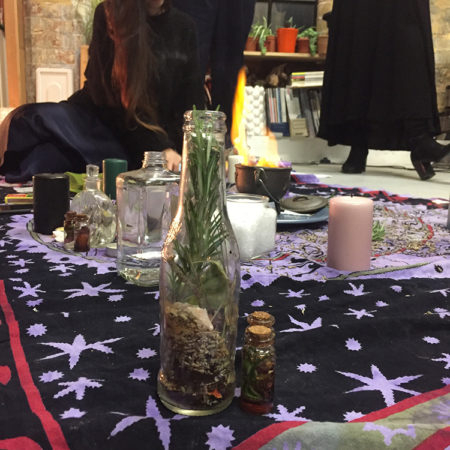
JH: Joseph’s Queer Spirits programme kicked off last week with Spell Casting with Intent, where we learnt about how to make spells from various materials like herbs, fruits, tobacco and spices. I loved being a participant in this event, doing something with other people as a ritual which wasn’t say drinking or eating. I think we have lost a lot of that sense of community gatherings and rituals in the Western world, and I think these collaborative experiences are something so important for us as social creatures. We aim to continue these kind of events and gatherings within our programme. In the spring we will be starting a community greening programme — growing food, eating together, creating green spaces in Sneinton where the gallery is located and perhaps other sites in the city.**













